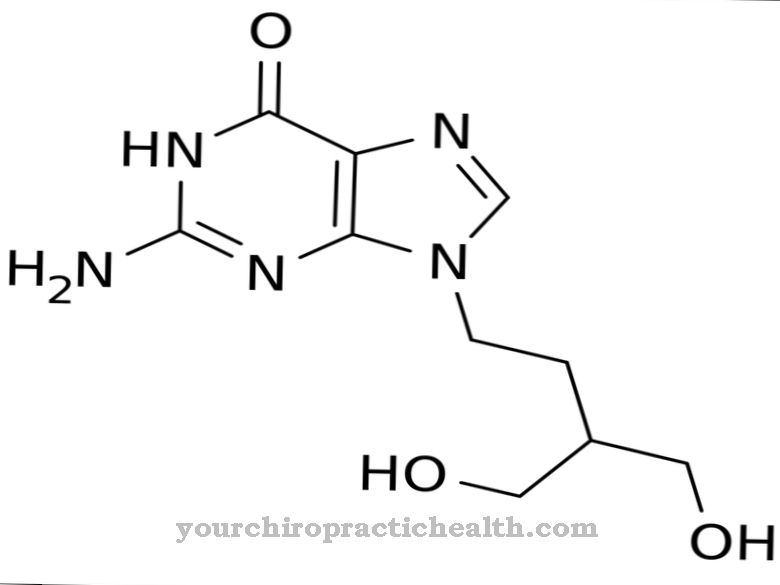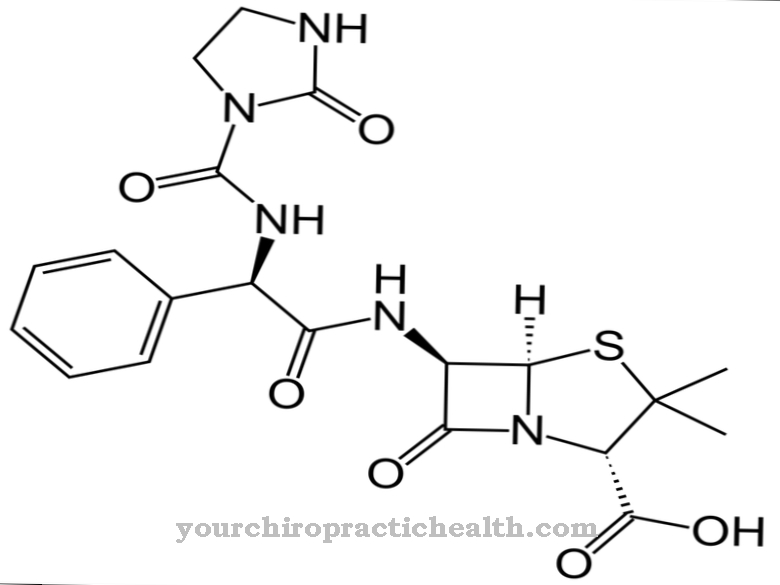Acyclovir is used to treat viral infections, especially herpesvirus infections. The active ingredient was patented in 1979. Since then, acyclovir has been used with great success.
What is acyclovir?

The drug acyclovir is one of the antivirals. It is mainly used in the therapy of herpes virus infections:
- general skin and mucous membrane infections
- Cold sore
- Genital herpes
- Inflammation of the eyes
- Shingles
Acyclovir is offered in different dosage forms:
- Tablets with 200 mg, 400 mg or 800 mg acyclovir
- Oral suspension at 40 mg / ml equivalent to 200 mg acyclovir
- Eye ointment with 30 mg / g acyclovir
- Lip cream with 50 mg / g acyclovir
The drug requires a prescription. Only lip creams containing acyclovir for the treatment of mouth and throat infections are available without a prescription but only require a pharmacy.
Pharmacological effect
As an antimetabolite, the active ingredient acyclovir inhibits the metabolic processes in a cell. Aciclovir only works in infected cells. After it has penetrated the virus, its enzymes convert the active ingredient into acyclovir triphosphate.
It prevents the herpes viruses from multiplying, and at the same time it is introduced into the virus genome. This ends the protein production and consequently the multiplication of the herpes simplex viruses, herpes genital viruses or varicella zoster viruses.
While topically applied acyclovir only works directly at this point, acyclovir taken orally can prevent the spread of the herpes virus throughout the body. The active ingredient can even relieve nerve pain in shingles. This mechanism is still unexplained. Acyclovir works better the earlier it is used.
Medical application & use
Acyclovir is used successfully as a herpes medication. It has an antiviral effect on infections with herpes simplex viruses, herpes genital viruses and varicella zoster viruses. Cold sores, mouth and throat infections, shingles, chickenpox, eye infections on the eyelid and cornea and herpes infections on the genital organs are the typical areas of application.
In addition, acyclovir cream applied to the skin soothes itching and mild to moderate pain. Special acyclovir eye creams and ointments should be used for the eyes. Tablets and drinking solutions (suspensions) are available for internal intake of acyclovir.
The duration of therapy depends heavily on the individual case. It usually lasts 5 to 10 days, sometimes longer. It is advisable to start treatment with acyclovir early. In addition to acute treatment, acyclovir is also suitable for the prevention and treatment of severe recurring infections with herpes simplex viruses, herpes genital viruses or varicella zoster viruses.
A further patient group for treatment with acyclovir are people with a weakened immune system. Whether congenital or later acquired - for example through immunosuppression after organ transplantation or during cytostatic cancer therapy: Acyclovir is a good preventive measure for patients at increased risk of infection.
Acyclovir is also indicated as an aid in the treatment of herpes simplex encephalitis (inflammation of the brain). Here it works in the form of an infusion solution.
Risks & side effects
Side effects rarely occur during therapy with acyclovir. Local application with a cream or ointment can lead to reddening of the skin, dry skin, itching, burning sensation or peeling. Contact dermatitis very rarely develops]. With the internal use of tablets, symptoms such as itching, rash, dizziness, headache, diarrhea, abdominal pain, nausea and vomiting have also been reported rarely.
There are no known clinically significant interactions with other drugs. Occasionally, increased laboratory values for bilirubin, liver enzyme, urea or creatinine in the blood can show. If no harm to children could be detected in the therapy of pregnant women with acyclovir tablets, it should be carefully considered whether acyclovir treatment can be dispensed with during this phase. Breastfeeding should be avoided as the active ingredient can be found in breast milk. Applying a cold sore cream with acyclovir is not a problem during pregnancy.
Since the active ingredient acyclovir is mainly excreted via the kidneys, a carefully adjusted dose should be prescribed by the doctor in the case of existing kidney failure. Aciclovir should be used and dosed carefully in people over 65 years of age and people with a weakened immune system. Contact lenses must not be worn during eye treatment. Aceclovir tablets are unsuitable for children under the age of 5, but drinking solutions are. Both forms of administration are taboo for newborns.



























